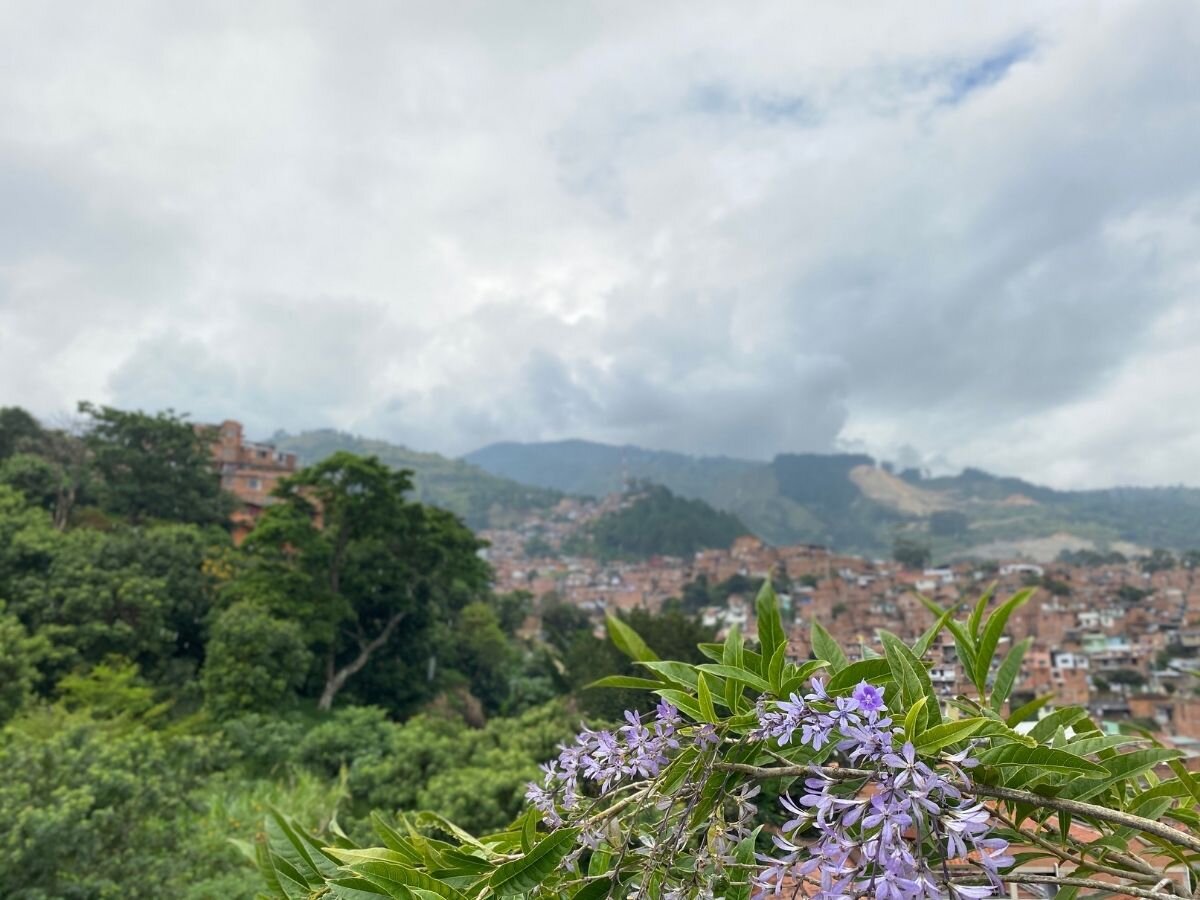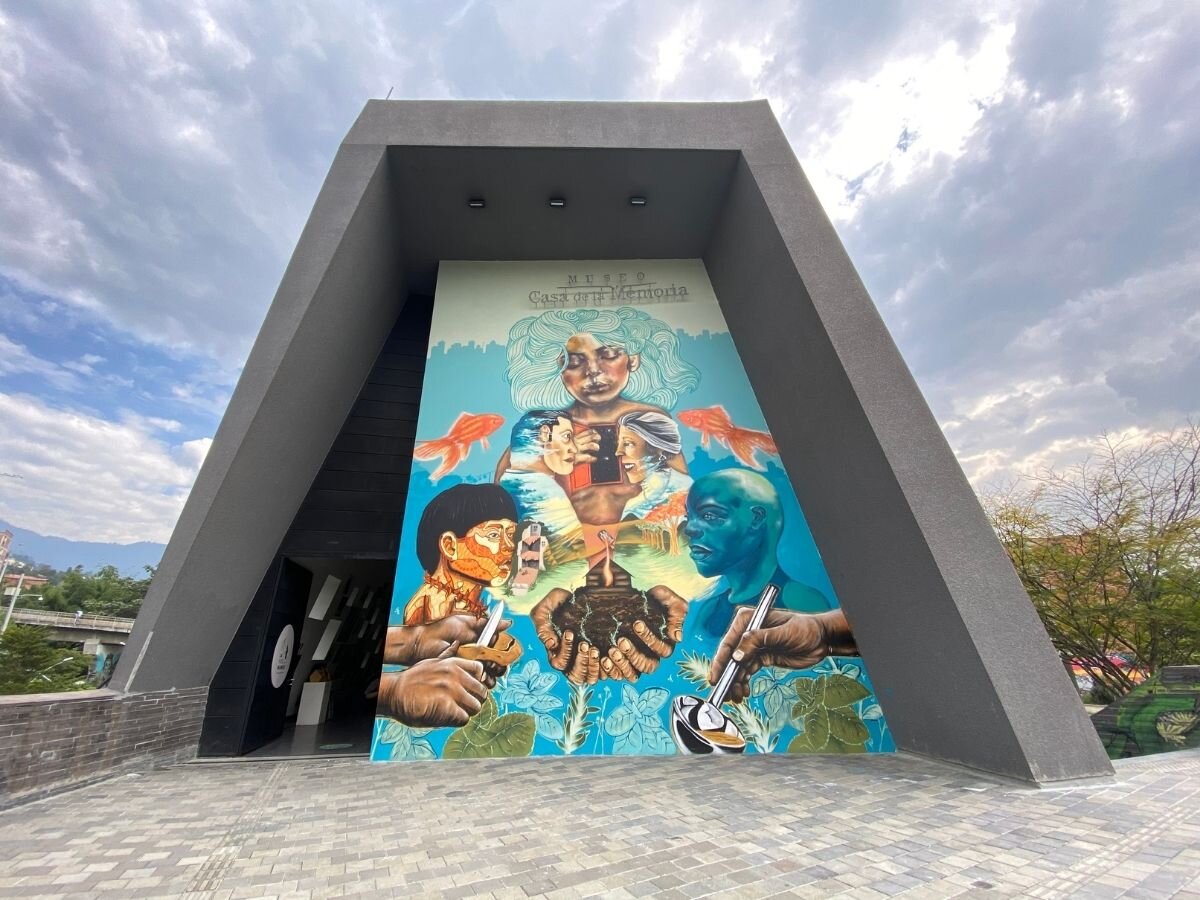How Not to Be a Shitty Tourist in Colombia
The maze of Cartagena’s Getsemaní neighborhood.
At the end of an impromptu motorcycle trip through Central America, I spent two weeks in Colombia before begrudgingly flying home to commence my Real Life (remember those days when theatre wasn’t canceled forever?). A complete culture shock after a few months on the other side of the Darién Gap, Colombia was everything I’d hoped it would be, and perfectly remedied the travel fatigue which had begun to creep up on me after long drive days and border crossings between Guatemala and Panama.
Of course, there’s very little I can claim to know about a country nearly the size of Greenland after only two weeks and two cities. What I can speak to, however, is the country’s relationship with tourism, which is—as usual—rife with tension and complexity. All the locals I spoke to about this reiterated the same few messages, which I’ve attempted to compile into this How-[Not]-To guide. If you’re interested in visiting this vibrant, lovable country with such an infamous reputation and harrowing past, take note…and try not to be the literal worst.
One perk of a mountainous city like Medellín: the forest is only a quick metrocable ride away.
Bring Your Own Drugs.
I know, I know. That’s not particularly useful advice if you’ve ever seen Locked Up Abroad, nor is it enticing when the whole point of backpacking Colombia is, well, the reputation am I right?
In all seriousness, drug tourism is a huge issue with devastating consequences for Colombians. Locals (and yes, young locals I wouldn’t immediately consider prudish) literally begged us with tears in their eyes not to participate in this common tourist activity which fuels so many problems within local communities.
Unfortunately there is a flip side—locals sometimes fuel this exploitation by offering to sell coke to anyone who looks like an obvious tourist. Our taxi driver, our bartender, a man living on the street…eventually it became a running joke. But leaving the tourist traps and hearing from those most affected revealed the horrors of the industry and sucked the laughter out of the room.
View from the start of a free walking tour, moments after the tour guide cried about her family’s experience living through the drug-fueled violence.
Here’s an excerpt from a piece in The Guardian from 2018 about this issue:
“I remember going for drinks with some British graduates who were working in Comuna 13, a notoriously violent Medellín neighbourhood. We had a conversation about the legacy of Pablo Escobar’s notorious drugs cartel, and one of the women expressed her distress at the damage that it had caused for the younger generations. She aspired to work in development and seemed pretty right-on. Half an hour later she was snorting coke in the corner of the bar. It was an attitude I grew familiar with among some researchers and tourists visiting Colombia.
There’s a wilful disconnect that people seem to be able to make between their actions and the bigger picture, and it’s pretty inexcusable coming from well-off, well-educated westerners who can’t really claim ignorance. I witnessed first-hand the effects of the drug war in Colombia, the legacy of corruption that the cocaine market financed, and the severe impact that it has had on the lives of people who want nothing to do with it.”
Colombia has so much more to offer than its party scene. Make the most of your trip here by showing up for the community as a positive participant rather than a burden perpetuating harm. For more info check out this article from World Nomads.
Another mountain city perk? Modes of transportation: escalators, gondola lifts and slides.
Don’t flagrantly discuss national trauma.
Yeah, Narcos is fun entertainment for us, but actually having lived through that terror in the not-so-distant past is often a different story. Like any country with a dark history (and which don’t?), it can be part of the allure to stand on the exact spot where something horrible went down but is no longer happening now.
No, you don’t need to pretend it never happened, but please be mindful of the fact that many locals lost their loved ones due to the events surrounding your binge-worthy Netflix series. Whether you’re on a walking tour exploring the city in a gaggle of other wide-eyed tourists or you’re getting to know locals, keep in mind that this piece of their storied history may be raw, divisive, and upsetting to chat about casually or hear spoken of excitedly by strangers whose only source of information is Hollywood.
Museo Casa de la Memoria in Medellín. Some American dude obsessed with microdosing tried to turn our visit here into a date, but the museum has a Holocaust Memorial vibe so that didn’t work out too well for him. Probably the most impactful experience of my entire two weeks in the country.
Use your platform and travel privilege to dispel myths and support local resiliency efforts.
Ask yourself: Do I have Passport Privilege™? Does my homeland exist according to international law? If I were to be detained, would it be indefinitely? If my country doesn’t have a great relationship with the next country on my bucket list, can I wiggle my way in with a lil $60 visa fee? Am I allowed to step foot onto my dream country at all? Am I allowed anywhere?
If you answered yes to one or more of these questions—Congratulations! You were born very lucky.
Christmas lights view from the Medellín metrocable
Now, ask yourself: Do I speak the lingua franca of the digital age? If I were to go to a museum anywhere in the world, would my native language be the primary/alternate text? If I were to get lost in a foreign country, would I have a relatively high chance of finding someone who would gladly butcher their way through my language to impress their friends and give me directions? Or let’s say I was traveling alone and wanted to make friends at a hostel/walking tour/bar/view point/scuba diving class—would I have to think extra hard just to keep up with conversation, or is it more likely that everyone else will switch to a language I don’t need to think about so I can go on preoccupying myself with having the time of my life?
Yes? Cool. Seriously.
And, finally: Do I have friends? A family? Coworkers? Do I know anyone at all? Do I have social media of any kind? Do I or will I have children? Friends with children? Do I have any money whatsoever? Do I spend any of it on anything, ever?
Then you have a platform. And it is my completely subjective soap box opinion that you should use those powers for good, especially when visiting a place with such a complex history and terrible reputation.
Share what you learn. Amplify voices of lived experience. Don’t be that asshole everybody mutes on Instagram because all you post are vapid vacay photos.
Remnants of the deadly 1995 bombing of an iconic Boterismo sculpture.
Act like you’re visiting your in-laws for the first time.
So, I grew up in the San Francisco Bay Area. If you’re familiar with our metro system BART, then you know it’s absolute garbage: weirdly limited destinations, trash everywhere, dark blue fabric seats covered in some sort of dried (if you’re lucky) vomit, other bodily fluids caked and splattered on the walls, tons of graffiti, and the sense that you are definitely sitting where someone recently peed.
For somewhere that makes makes NYC rent look like a steal, you’d think we’d have our shit together. Yet every time I visit a new city (especially in a country with less wealth and international clout than the US), I begrudgingly add it to the list of places far nicer than my own hometown.
The US has a lot of reasons for being behind the curve on this, most of which involve corporate greed (who knew?). I may have an unpopular opinion on this subject, but I believe there’s one huge factor which only tangentially involves late-stage capitalism:
Americans have no respect. As the [eleventh] richest country in the world, we don’t need it! We take our amenities and our only-semi-knee-deep-in-corruption government for granted. We litter even in cities with kick-ass recycling programs, we leave our massive houseless population to fend for themselves, and we value individual liberties high above community, solidarity, and the collective good.
Murals are regularly commissioned all over Medellín’s Comuna 13 as one of many rehabilitation projects.
Not every country is like this. In fact, my experiences abroad have led me to see the US as an outlier when it comes to values of cooperation, hospitality, kindness, and world views more broadly. So if you’re American or from another place of immense privilege, please look around you and notice what locals value, and do your best to treat those systems/traditions/expectations with respect.
This long-winded plea stems from my experience using the Medellín metro in all its sparklingly-clean glory—a transit system which revolutionized the city’s economy—bringing prosperity and safety to Medellín by creating job access to countless residents who once lived too far up the mountain to find sufficient work.
Speaking of, here’s another way to treat the country like you’re at your in-laws: try not to inadvertently insult it by making assumptions about infrastructure. I asked our hostel receptionist in Cartagena if the water was safe to drink (because I’d just spent two months backpacking through countries where it almost always wasn’t) and he defensively scoffed, retorting back that of course the water is safe to drink! It’s safe in all major cities in Colombia! For life-or-death pieces of information like this…just Google it first. And notice/appreciate when locals brag about the kinds of amenities your country takes for granted. Like the fact that hot water is a regular selling point.
Never once in Cartagena did I mind having to take ice cold showers.
(Literally) step outside your comfort zone.
Biggest highlight of Cartagena was the Mercado de Bazurto, a massive, nearly tourist-free market with the most delicious food I’d eaten in months of traveling.
Almost all of the tourists I met in both Cartagena and Medellín stayed within the confines of the cutesy tourist centers for the entirety of their trips. While I would normally say to each their own, Colombia just isn’t that kind of place.
There is so much to gain from leaving the hostel strips and hipster neighborhoods: the best food (that’s all that matters to me let’s be real), the music and dancing, the prices…it is definitely in your best interest to thrust your nervous lil gringo self into daily life and get a sense for what makes this country so beautiful even when spectators aren’t perched with their cameras. People are kind, often thrilled to share their culture with visitors who are actually interested, and, of course, more than happy to take your money as the country continues to recover from a narrative wrought with international fear.
So that’s it. Don’t be shitty. Don’t make things worse. Golden rule yadda yadda. If you’re interested in reading more about ethical tourism, check out this post.











